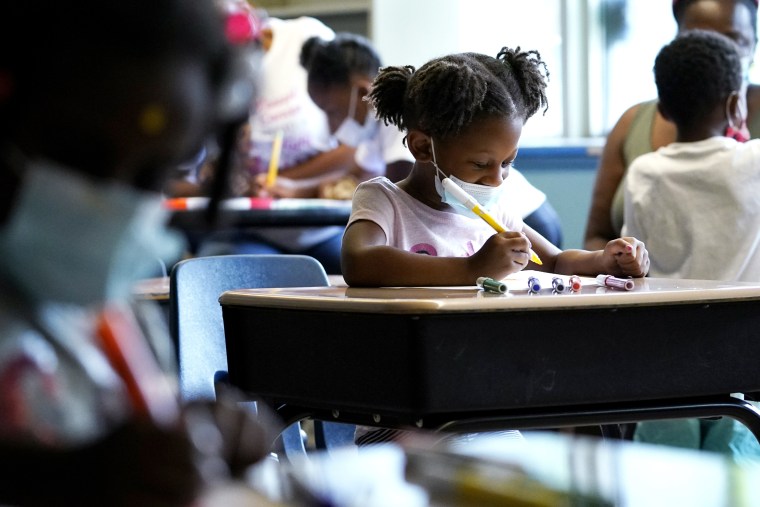
The change in advice reflects a shift from preventing Covid infections to protecting against the most severe outcomes of the virus.
Get more news Live Aug. 11, 2022, 7:00 PM UTCStudents can stay in their classroom this fall if they've been exposed to Covid, the Centers for Disease Control and Prevention said Wednesday in an updated guidance.
The transition away from quarantining signals an end to several years of remote schooling that stunted learning and increased mental health problems.
"The updated CDC guidance recognizes that the best place for children is in the classroom and that this can be done safely with acceptable levels of risk," Dr. Richard Besser, a pediatrician and president of the Robert Wood Johnson Foundation, said in an email. "This is essential for their social and emotional development, physical and mental health, and academic success."
As of Wednesday, the CDC no longer recommends that people quarantine after they have a Covid exposure, unless they are in high-risk congregate settings, such as jails, nursing homes and homeless shelters.
Schools, however, are not considered to be high risk. In case of an exposure, the CDC now says students and school staff who remain asymptomatic should wear a high-quality mask for 10 days, and get tested on day five.
The change reflects a shift in public health’s response to Covid, from an attempt to prevent infection to a strategy focused on preventing the worst outcomes of infection.
"The current conditions of this pandemic are very different from those of the last two years," Greta Massetti, a senior epidemiologist with the CDC’s National Center for Injury Prevention and Control, said during a call with reporters Thursday.
"High levels of population immunity due to vaccination and previous infection and the many available tools to protect the general population and protect people at higher risk allow us to focus on protecting people from serious illness from Covid," she said.
In fact, 95% of the U.S. population has some level of immunity against Covid, Massetti said.
The CDC's advice for people who test positive for Covid, however, has not changed.
Isolate for at least five days, as people are most contagious during those first five days, according to the CDC. Isolation can end after day five as long as symptoms are improving and any fever is gone, however masking remains recommended through day 10.

People who have more severe Covid symptoms, such as trouble breathing, should consult a doctor and isolate through day 10, the recommendations say.
And regardless of vaccination status, people should still wear masks indoors in areas with high levels of Covid transmission — including in schools.
The guidance still encourages vaccination, testing for Covid if symptoms develop, and staying home from school or work when sick.
But the shift from quarantining advice, the CDC said, comes as the nation has developed robust immunity from the virus due to vaccination, prior infection or both.
According to the CDC's data tracker, 91,676,264 Covid cases have been reported in the U.S. since the beginning of the pandemic. The number of new Covid cases hover just over 100,000 per day, on average. That’s likely a vast underestimate because of at-home testing that doesn’t get reported to health authorities.
The tracker also shows that 78.8% of the U.S. population has had at least one dose of Covid vaccine.
Because quarantining is no longer needed, the CDC dropped its "test to stay" recommendations following an exposure.
Download the NBC News app for full coverage of the Covid-19 pandemic
The most significant update in the CDC guidance is for school children, and it follows similar guidelines from other public health entities, especially as the number of weekly cases among children has fallen significantly since spiking at nearly 1 million in mid-January.
Children's Hospital of Philadelphia, for example, has also simplified its guidance to school districts in the surrounding area.
"Despite the fact that we're still seeing a fair amount of Covid transmission across the country," said Dr. David Rubin, director of PolicyLab at Children's Hospital of Philadelphia, "the risk of severe disease is going down."
As that risk declines, Rubin said, it's allowing school districts to ease up on some mitigation measures that kept kids out of class.
This is the "next step toward normal," he said, likening the new guidance to how influenza is handled annually. Schools tend to shut down only during severe flu outbreaks.
The CDC said its updated guidance "provides flexibility" so schools and other local officials can tighten or ease up on their mitigation protocols based on the spread of Covid in each community.
"We're going to have to embrace some risk in terms of transmission," Rubin said, "to allow families with young children to get their lives back to normal."
Erika Edwards is a health and medical news writer and reporter for NBC News and "TODAY."